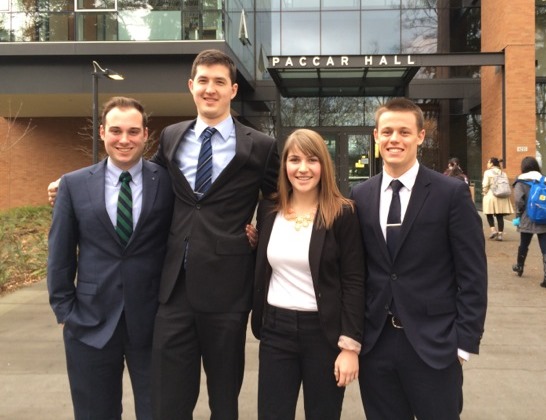Building the business case for applied learning: Strategic Management Case Competition

Alaska Airlines presentation team: Kenny Thompson, Tyler Waterer, Mackenzie Meier and Jordan Barr
An Alaska Airlines jet soared overhead as a group of four Foster School seniors emerged from the Customer Services and Innovation team headquarters last Friday. Spirits were soaring too as Jordan Barr, Mackenzie Meier, Kenny Thompson and Tyler Waterer had just presented their recommendations on how to make Alaska Airlines the “easiest airline to fly” to a senior leadership team. The students landed the opportunity to present their ideas to the Customer Innovation team because they outperformed 33 teams of their peers (161 participants) in the fall 2013 Foster Strategy Development case competition.
The competition has been described as the capstone experience to a capstone course. All graduating seniors are required to take strategic management, a course designed to assimilate and apply academic theory to real business issues. The goal is to provide students with practical experience prior to launching into their careers. Offered in the fall, winter and spring and summer, the course draws between 150-300 students per quarter.
Beginning in the fall of 2012, undergraduate program faculty, staff and administrators had the vision of bringing valuable case competition experiences to all Foster School of Business students. Initially, the case competition was optional, done in lieu of a final exam. During the first fall quarter, about 100 students in 25 teams (80% of total class population) participated. Quickly, the value of this experience was recognized by all stakeholders.
According to Clay Schwenn, case competition coordinator and assistant director of student leadership and development, a key learning for students is to be “able to take the theoretical knowledge they have acquired over the years and create something concrete. They generate a set of recommendations to people who could actually implement them.” This is powerful for the students and for the client companies.
Course coordinator Rick McPherson, a veteran of the telecom business for over 25 years, knows the importance of how to “sell” ideas to executives. He sees incredible benefit not only to the students in terms of richness of learning, but also for the companies. McPherson noted “particularly with the presentation to Alaska Airlines you saw how a well thought-out analysis and recommendations were really attractive to a company. Our students demonstrated that they can come up to speed to understand an industry and a business opportunity and create realistic ideas that a business can pursue.”
At Alaska Airlines Customer Innovation headquarters, the moment the students began their pitch, the dozen company leaders in attendance began taking notes, and then asking questions and soliciting the student’s perspective on wide raging issues from the usability of their web interface to competitive market analysis. Student team members Mackenzie, Kenny, Jordan and Tyler’s polished presentation skills left a strong impression on the leadership team. Their confidence, depth of knowledge and ability to respond quickly and thoughtfully to challenging questions will translate well to job interviews and future executive level presentations. From Jordan Barr’s perspective, “the most rewarding aspect of making our pitch to the Customer Innovations team at Alaska Airlines is the thought that our solution could be implemented in the company. It clearly shows that Alaska Airlines didn’t just do this to say they were involved—they did this because they truly want to innovate and do something different. It is an incredible feeling to know that they will be using our advice moving forward in their solutions—and it doesn’t hurt that they want to hire us.” Tyler Waterer commented, “Without Foster’s partnership with Alaska Airlines, we wouldn’t have had the opportunity to have this kind of learning experience (while) still in college.”
The success of the case competitions has focused on sourcing local businesses (past case companies have included: Microsoft, Amazon and Seattle City Light) and creating forward-looking cases on current issues the company is tackling. This approach of what should a company DO, not what they should have done creates urgency for the issue and maximizing the impact the students can make. Stay tuned to see student ideas take flight in other businesses.
